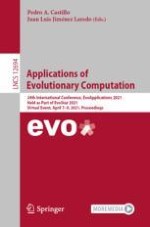2021 | OriginalPaper | Buchkapitel
Deep Optimisation: Multi-scale Evolution by Inducing and Searching in Deep Representations
verfasst von : Jamie Caldwell, Joshua Knowles, Christoph Thies, Filip Kubacki, Richard Watson
Erschienen in: Applications of Evolutionary Computation
Aktivieren Sie unsere intelligente Suche, um passende Fachinhalte oder Patente zu finden.
Wählen Sie Textabschnitte aus um mit Künstlicher Intelligenz passenden Patente zu finden. powered by
Markieren Sie Textabschnitte, um KI-gestützt weitere passende Inhalte zu finden. powered by
